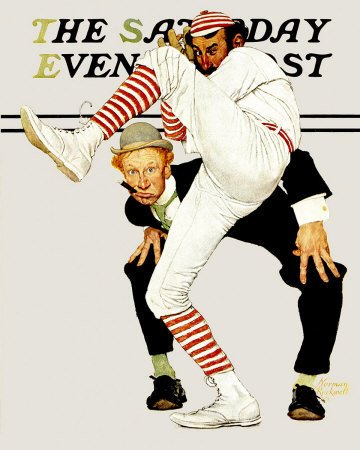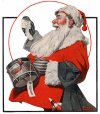 |
||||||||||||||
Hundredth Year of Baseball by Norman Rockwell
July 8, 1939 Issue of The Saturday Evening PostHundredth Year of Baseball, a Norman Rockwell painting, appeared on the cover of The Saturday Evening Post published July 8, 1939. This illustration is a favorite of Rockwell collectors and baseball fans alike, a true classic for the ages. An alternate title for this painting is Baseball Player and Umpire. This painting was Rockwell's fourth cover for The Post in 1939. In 1939, there were eight Norman Rockwell Saturday Evening Post covers published. This was also Rockwell's 187th overall cover illustrationout of 322 total for the Post. Rockwell's career with the Post spanned 47 years, from his first cover illustration, Boy With Baby Carriage in 1916 to his last, Portrait of John F. Kennedy, in 1963. The original oil painting, 34.5 inches by 27.5 inches or 87 by 70 cm, is part of the collection of the National Baseball Hall of Fame in Cooperstown, New York. It was donated to the Hall by Rockwell and Curtis Publishing. This illustration has been reproduced in four Rockwell commentary books, on page 41 of The Norman Rockwell Album, as illustration 195 of Norman Rockwell's America by Christopher Finch, as illustrations 251 and 339 of Norman Rockwell: Artist and Illustrator by Thomas Buechner and on page 114 of Norman Rockwell, A Definitive Catalogue by Laurie Norton Moffatt. I have seen pristine original copy of this cover still attached to the magazine sell for more than one hundred dollars on eBay. And to think it only cost five cents when it was published!
Hundredth Year of BaseballGiclee Prints on Archival Paper: This classic Norman Rockwell painting celebrates the game of baseball's first one hundred years of being played. Hundredth Year of Baseball was most likely painted during the winter months of 1948 and 1949. Rockwell meticulously planned each of his compositions. At this point in his career, he worked almost exclusively from photographs. Having obtained the many poses he needed to choose from his models, he no doubt set about planning his tribute to baseball's anniversary. This is a simple composition. There are only two characters. Rockwell uses these two characters and a bare background to take us on a trip all the way back to the dawn of America's pasttime. The pitcher wears a simple white uniform. His stockings are red and white striped, as is his cap and belt. I was unable to discover which team he is pitching for. Knowing how determined Rockwell was to be historically and factually accurate in his illustrations, there most certainly was a team that wore this uniform. Hundredth Year of Baseball was only one of 322 Norman Rockwell Saturday Evening Post covers; Here is the list of Norman Rockwell Saturday Evening Post cover illustrations.
Here is the complete list of all Norman Rockwell magazine covers. If you know or have any good guesses, please use the comment form below. Be as specific as possible. The umpire, oddly enough, stands behind the pitcher. I know that there are umpires manning the infield in the modern game, but they do not stand directly behind the pitcher. The close proximity between them may have been done by Rockwell to be able to get the two characters on one canvas and have them close enough to give some detail.
(Image Only) Copyright © 1939 Saturday Evening Post & Curtis Publishing Company
Remember to check back often.
|
Norman Rockwell Quotes:I'll never have enough time to paint all the pictures I'd like to. No man with a conscience can just bat out illustrations. He's got to put all his talent and feeling into them! Some people have been kind enough to call me a fine artist. I've always called myself an illustrator. I'm not sure what the difference is. All I know is that whatever type of work I do, I try to give it my very best. Art has been my life. Right from the beginning, I always strived to capture everything I saw as completely as possible. The secret to so many artists living so long is that every painting is a new adventure. So, you see, they're always looking ahead to something new and exciting. The secret is not to look back. I can take a lot of pats on the back. I love it when I get admiring letters from people. And, of course, I'd love it if the critics would notice me, too. You must first spend some time getting your model to relax. Then you'll get a natural expression. More at BrainyQuote. Rockwell Favorites
|
|||||||||||||
|
|
||||||||||||||
|
Images are copyrighted by their respective copyright holders. Graphic Files Protected by Digimarc. Contact us for details about using our articles on your website. The only requirements are an acknowledgement and a link.
|
||||||||||||||
















